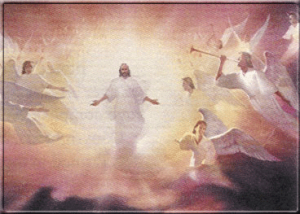
First Thessalonians 4: The Coming of the Lord
13 But we do not want you to be uninformed, brothers, about those who are asleep, that you may not grieve as others do who have no hope. 14 For since we believe that Jesus died and rose again, even so, through Jesus, God will bring with him those who have fallen asleep. 15 For this we declare to you by a word from the Lord, that we who are alive, who are left until the coming* of the Lord, will not precede those who have fallen asleep. 16 For the Lord himself will descend from heaven with a cry of command, with the voice of an archangel, and with the sound of the trumpet of God. And the dead in Christ will rise first. 17 Then we who are alive, who are left, will be caught up together with them in the clouds to meet the Lord in the air, and so we will always be with the Lord. 18 Therefore encourage one another with these words. (English Standard Version)
Thessalonians is one of the earliest books of the New Testament. (Some think the earliest. F.F. Bruce suggested the possibility that Galatians preceded it. But overall, James was probably the first.) Understandably, these new Christians in this new church had questions and misunderstandings that needed answers.
KEY Context: As v. 15 shows, (with reference to those who are still alive) this section answers questions about “the coming* of the Lord,” parousia* in Greek. I.e. the Second Advent–SEE Footnote. It begins in v. 13, the key verse of the context, with Paul addressing their concern about fellow Christians who have already died. Were these who had died now at some disadvantage? What hope did those who still live have for them when Christ returns?
Verse 14 points to Jesus’ death and resurrection, the central theme of Christian hope concerning those who have died.
See 1 Corinthians 15 where Paul addresses the question of the resurrection. Christ’s resurrection was the first fruits, and the resurrection of Christians is the final harvest, v.23 “at His coming (parousia)” when “we shall all be changed—in the twinkling of an eye, at the last trumpet” (verse 52).
Verse 15 gives the key point of this passage (addressing the concerns of the Thessalonians) that, when Christ returns, the living Christians have no advantage over those who have died.
Verse 16 describes, in familiar terms (for us who have the NT), Christ’s return (parousia). This is no secret event.
This Coming is described in the same terms as other passages about the Lord’s coming:
“For the Lord himself will descend from heaven with a cry of command, with the voice of an archangel, and with the sound of the trumpet of God….in the clouds…”
Acts 1 “…a cloud took him out of their sight….’This Jesus, who was taken up from you into heaven, will come in the same way as you saw him go into heaven.'”
Dan 7 “…with the clouds of heaven
there came one like a son of man”
Rev 1 “…Behold, he is coming with the clouds, and every eye will see him…”
Mark 13 “…then they will see the Son of Man coming in clouds with great power and glory. 27And then he will send out the angels and gather his elect from the four winds, from the ends of the earth to the ends of heaven…”
1 Corinthians 15 “We shall not all sleep, but we shall all be changed— 52in a moment, in the twinkling of an eye, at the last trumpet. “
Verse 17 pictures the “we” who are still alive as following those who have died “to meet the Lord in the air…”
To meet [apantasin] the Lord… “When a dignitary paid an official visit (parousia) to a city in Hellenistic times, the action of the leading citizens in going out to meet him and escort him back on the final stage of his journey [to that city] was called the apantesis” (F.F. Bruce,I &2 Thessalonians, WBC). R.C. Sproul vivdly describes this historical usage by Paul–starting at 10:20 mark, here.
See N.T. Wright speak of this, here.
Verse 18 (This is no Gnostic revelation of some new doctrine of a secret ‘rapture’.) The whole point of this passage is to encourage each other in the hope given to us regarding death through Christ’s death and resurrection.

*Parousia. In the NT, parousia, with reference to Christ, refers exclusively to Christ’s Second Advent, his Second Coming, “…the coming of Christ at the end-time for the general resurrection, last judgment and the creation of the new heaven and earth.”--The New International Dictionary of New Testament Theology, s.v. “present” (II:899ff).
See two other posts: 1) NT Prof. Ben Witherington on origins of ‘rapture theory’ and 2) on the text of Mat. 24, “…taken and the other left”–the opposite of ‘rapture’ teaching. Here –-Amen. I Want to be Left Behind.
And here is a third faithful witness to true Bible teaching, this warning Corrie Ten Boom(link) gave against false teaching: “There are some among us teaching there will be no tribulation, that the Christians will be able to escape all this. These are the false teachers that Jesus was warning us to expect in the latter days.”
Here is the new Prequel to these articles. Be sure to read it.
https://textsincontext.wordpress.com/2023/03/15/on-i-thessalonians-not-leaving-context-behind/
[CORRIE TEN BOOM Letter, Link: Warning of ‘Rapture’ Teaching]
N. T. Wright: “Rapture is an American Obsession.” It is not found in the New Testament





